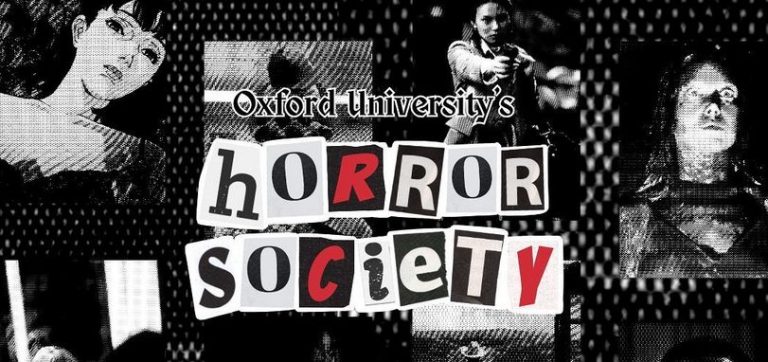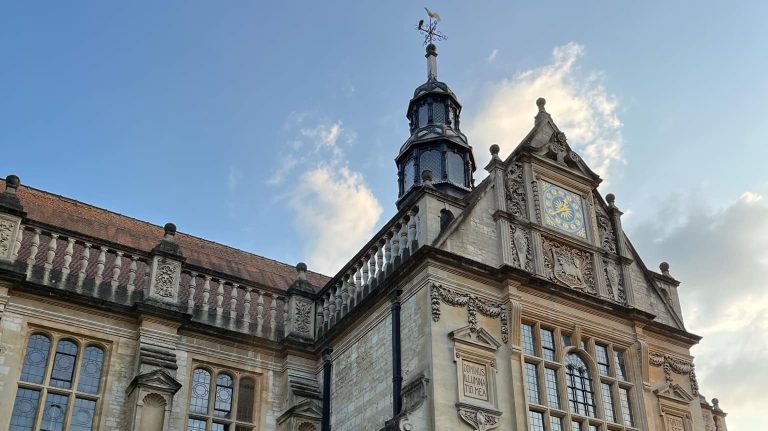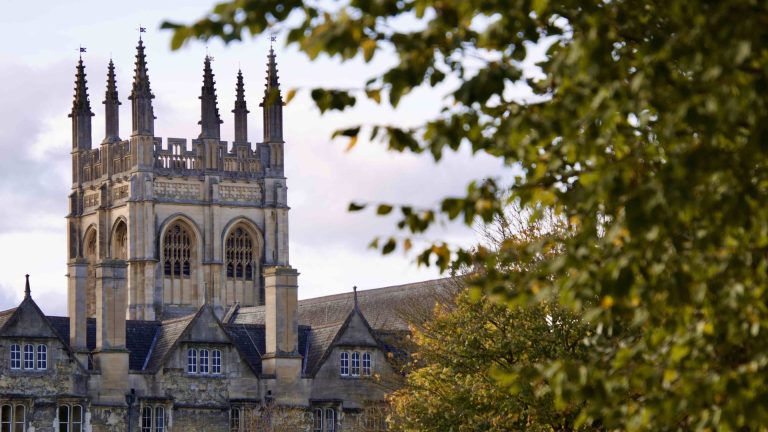The Oxford Horror Soc, led by Izzy Reese as President and Honor Davies as Public Communications Officer, is Oxford’s first and only society dedicated to the on-screen horror genre. Since their founding, they have shown everything from silent film classics like The Cabinet Of Dr. Caligari (1919) to television hits like Hannibal (2013) and modern genre staples like Saw (2004).
How long has your society been around? Why did you decide to take on the role of President?
Izzy: Purely from looking back at the Instagram profile it looks like it’s been around from 2022 but I’m not entirely sure, it might have existed for a bit longer than that. But, I took it over simply because I was a huge fan of it last year. It was one of the only societies that I consistently went to in my first year and then when I found out that the committee members were all graduating that year, I thought I want to keep it going cause I want to continue my journey exploring horror films. I took it over for purely selfish reasons, just because I like it.
What do you think is the importance of student film societies?
Izzy: For me, specifically for Oxford, it’s a nice change of pace from what we are all doing most of the time. Because I study English and German, I can’t bring myself to read for fun anymore, especially during term time, so it’s nice to be able to explore art and creativity through a medium that is so different. To have a society that reminds you to keep going, to keep enjoying things that aren’t just work, it’s important for me, at least.
What differentiates you from other film societies is that you focus exclusively on horror. What do you think makes horror special enough to have an entire society just dedicated to it?
Izzy: That’s a tricky question but I think that it seems like a state of mind that you have to get into. I know that’s so annoying to say but to be in a sort of mood to have a spooky evening feels a bit different from just a film society where you come to see anything. Also I think we attract a particular crowd of goths and emo. I remember last year I’d sit down to watch a film and there would be so much eyeliner in one room. It’s good! It feels like a real community of people who like celebrating Halloween when it’s not Halloween.
Horror tends to be divisive. It has always been caught up in debates surrounding gratuitous violence, graphic depictions of sexual acts and the appropriation of sacred symbols. However, at the same time it has always been a genre that is really effective at transgression. How do you manage these tensions when making a term card? Do you try to achieve a balance between the two ends of the spectrum?
Izzy: Absolutely! Because it’s a diverse genre in terms of what it means when you’re talking about horror films. It does feel important to have a wide range of what we are actually putting on. If I did seven slasher films in one term, it’s not even representative of horror films – that would be slasher society, that’s a different thing. I think it’s good because it means that more people can enjoy it: I know it’s one of those few genres where people have an actual limitation: some people just cannot do jumpscares, or really scary stuff so I want to open up the society to like people who don’t enjoy being terrified out of their minds. We do like to bring out quite a few different ones so that everyone can enjoy it.
You are a female-led society, the horror genre is notorious for its abuse of the male gaze. When you are picking films and filmmakers for your term card is this something that you have in consideration?
Izzy: I wouldn’t call myself an expert in horror films so a lot of the time I’m going into these films kind of blind or with received cultural knowledge. So, as much as sometimes we do try to focus on things that we want to see, which often end up being more female-led or less exploitative films, I think it’s unavoidable in the horror genre and part of our society is doing a little bit of discussion about that kind of thing. So, there’s an element with horror in which all the things that are happening, completely out-there deaths and things like that. You have to take a step back and sort of think about it as something you are watching, rather than something you are getting too involved in. That certainly helps me when I am trying to reckon with what can be a very misogynist genre.
Do you find that horror fans drawn to your society are more permissive towards the genre than those less interested in it or are they more critical? And do you find that the films you select tend to spark a lot of debate between people attending?
Izzy: I think there is usually a general consensus that it was fun to watch it all together. We don’t really tend to have people coming who don’t like horror at all. I think they would be making a poor decision for themselves if they did that. But, definitely, there are people who come and don’t necessarily know what sort of genre or subgenre this one’s going to be and so have different opinions and maybe express like ‘Oh this one was made by a nepo-baby’ or ‘This one was boring, didn’t like it’. So, there is definitely a spread of opinions. Most of the time, it’s just enjoyable. Even watching a bad film can be enjoyable and we do have space for that sort of terrible, horrible horror film, you know?
Who are some of the formative horror filmmakers for you? And what do you think makes their horror different?
Izzy: Recently, I’ve been really getting into body horror stuff. So Cronenberg and Carpenter and just like they are really fun for me, just like outrageous. I think that is what I really enjoy most about the genre, it is just taking the films in these completely ridiculous directions and being allowed to do that, being able to play with completely upsetting people’s expectations and things. I really enjoyed The Substance (2024) recently, mostly because I brought my mum with me and she hated the last ten minutes of that film, just saw no point in it. It was so fun to me. So, yeah, I’d say anyone who is in the body horror genre.
Halloween is coming up and as the President of a horror soc you are the best person to ask this question. What are some spooky films that you think everyone should watch at least once – whether or not they are fans of horror?
Izzy: I keep answering questions about what my favourite films are, so I’m very sorry not to give nuances every time. I feel like I should. But I think I’d probably just recommend the Rocky Horror Picture Show (1975) to absolutely everyone, regardless of whether they enjoy horror or not. It’s just so perfect as like a fun Halloween film to me, especially to watch with a bunch of other people. And it’s one of those films where I’ve rewatched it a million times and it just gets better every time you watch it. I don’t know if I can recommend any of the more classic ones, of the more definitely scary ones, with broad appeal because many of my friends would never watch them, anything that has remotely a jumpscare. I’m trying to think of some more fun ones. I mean we put on Killer Klowns from Outer Space (1988) last year. It was completely ridiculous, very camp, so much fun. Anything that just has a ridiculous title I would probably recommend giving a try this Halloween.
If our readers want to come to one of your screenings, where can they get more information?
Izzy: So, at the moment we are based in Jesus College. Every Friday at 7.30pm, maybe 7.00pm, depends on when we are allowed into the room. Find us on our Instagram or our Facebook page. Search for @ouhorrorsoc on Instagram and I’m sure you’ll be able to find it on Facebook. We keep you updated on what we’re doing and at what times so just follow those!
Interview has been edited for clarity.











